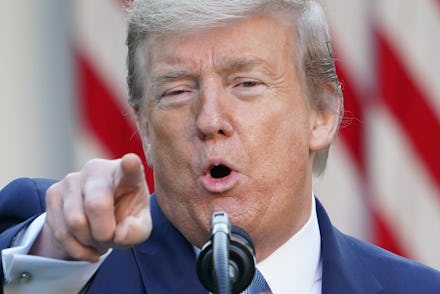Trump threatened to use a never-invoked Constitutional clause to appoint officials without congressional approval

Just days after bragging that he has "total" authority as commander in chief of the United States, President Trump took his apparent power-grabbing aspirations one step further Wednesday, threatening to utilize a never-before-invoked constitutional clause to adjourn Congress. That way, without pesky elected lawmakers in the way, he could push through a host of political nominees through recess appointments rather than wait for congressional approval.
"As the entire U.S. government works to combat the global pandemic, it is absolutely essential that key positions at relevant federal agencies are fully staffed, and we're not allowing that to take place through our Congress," Trump told reporters during his presidential second coronavirus briefing in the White House Rose Garden. "They're just not giving it to us. We have many positions that are unstaffed because we can't get approval."
While Congress is expected to remain essentially closed through the beginning of May, the Senate has conducted a series of pro-forma sessions in the interim. That means they're technically keeping the chamber active, and thus preventing the president from pushing through recess appointments — something Trump seems particularly displeased with.
In fact, Trump is not alone in his frustration with congressional leaders' decision to essentially go on break through May 4 — a delay which has hampered efforts to speed a new round of coronavirus relief to the president's desk.
"We have to make sure that we look out for the health and the well-being of those at the Capitol, our staff members, and of course the members of Congress,” Democratic Rep. Hakeem Jeffries (N.Y.) explained last month. “But at the same time, we have a job to do on the behalf of the American people in terms of responding to this extraordinary health crisis."
Legislating by distance has proven problematic, thanks to the ability of a single member to derail votes that would otherwise be passed with unanimous consent, a process that allows for votes even if every member is not present in the House chamber.
"Unless it’s safe, I think we’re better off doing our work as we’ve been doing, passing bills by unanimous consent," Democratic Rep. Nita Lowey (N.Y.) said. "Hopefully there is a bipartisan will to rally focus on what we need and leave partisan politics aside."
"It’s time for Congress to come into the 21st Century in terms of this issue," Republican Sen. Rob Portman (Ohio), who is pushing a bill to allow for remote congressional voting, told The New York Times. “Probably half my constituents are working remotely right now, in full or in part, and Congress hasn’t yet figured it out. I think we’re a little behind the times."
"The current practice of leaving town while conducting phony pro forma sessions is a dereliction of duty the American people can’t afford during this crisis,” Trump said Wednesday, while literal rats scurried past him. “They have been warned."
Article II, Section 3 of the Constitution says that the president:
[m]ay, on extraordinary occasions, convene both Houses, or either of them, and in case of disagreement between them, with respect to the time of adjournment, he may adjourn them to such time as he shall think proper.
The clause, which has never been invoked before, is predicated on a "disagreement" between both chambers of Congress about whether to adjourn or not — something which, in this case, has not taken place. And from the sound of it, Senate Majority Leader Mitch McConnell (R-Ky.), who has prioritized confirming as many Trump nominees to the judicial bench as possible, doesn't seem all that keen on calling all his members back for the legislative maneuvering required to create the requisite disagreement.
"The leader pledged to find ways to confirm nominees considered mission-critical to the COVID-19 pandemic, but under Senate rules, that will take consent from [Senate Minority Leader Chuck Schumer]," a McConnell spokesperson told the Times in response to the president's threat. In typically dry McConnell fashion, the message is clear: The majority leader has little appetite for going outside the regular process, which would require the cooperation of Democratic leadership in order to happen, just to appease the president.
So, while Trump might have the literal ability to ram through his nominees by doing an end-run around Congress, it doesn't seem likely — at least, not without a fight. Either way, Trump's authoritarian feint is just the latest in his long line of attempts to position himself as an unassailable leader whose power extends well beyond being one of three co-equal branches of government.